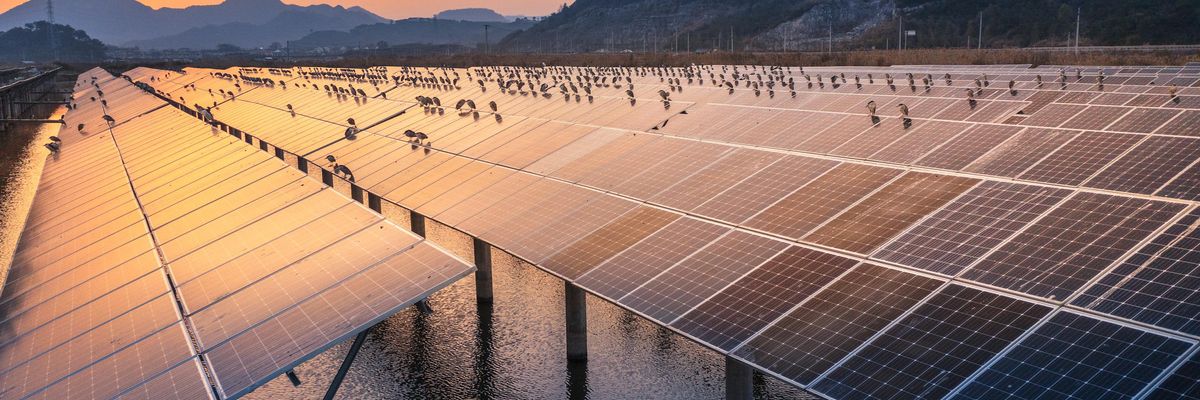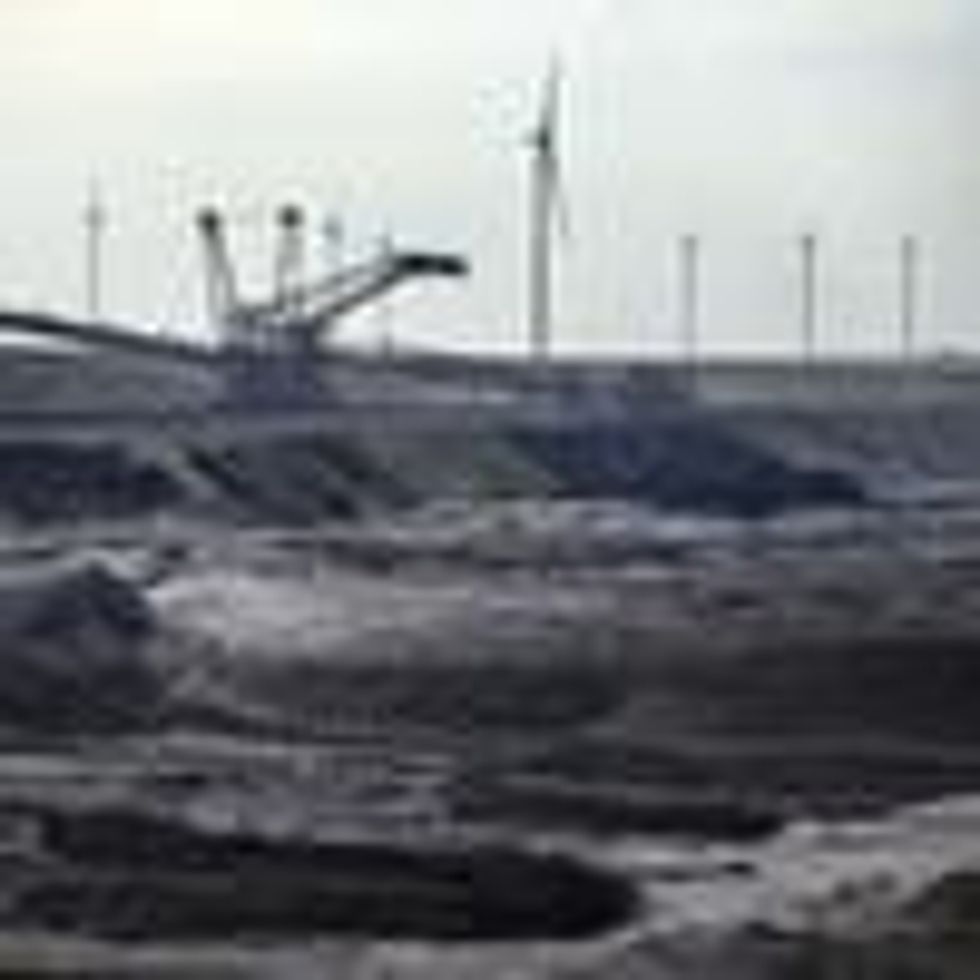
Swarms of night herons sit on a solar photovoltaic panel in Ninghai County, Zhejiang Province, China, March 22, 2021. (Photo: Costfoto/Future Publishing via Getty Images)
To donate by check, phone, or other method, see our More Ways to Give page.

Swarms of night herons sit on a solar photovoltaic panel in Ninghai County, Zhejiang Province, China, March 22, 2021. (Photo: Costfoto/Future Publishing via Getty Images)
Solar and wind energy had another good year for global expansion, the International Renewable Energy Agency said Monday, declaring that "the global shift to renewables is underway" but must accelerate.
The intergovernmental agency released its latest Renewable Capacity Highlights, which showed that total global renewable generation capacity in 2021 was 3,064 GW, reflecting a 9.1% increase from the year before.
New renewable capacity in 2021 was dominated by solar and wind, together accounting for 88% of net renewable additions for the year. Solar is truly soaring, according to the publication, with new capacity increasing in all the world's regions. Its total capacity has now outgrown that of wind.
The region with the largest global share of renewable capacity generation was Asia, capturing 48% in 2021. The region also accounted for 60% of new capacity for the year.
IRENA also reported capacity expansions in Europe (6.4%) and North America (9%), the latter including "a notably large expansion" in the U.S., where capacity increased by 32 GW.
\u201c\ud83d\udd14OUT NOW: @IRENA NEW 'Renewable Capacity Statistics 2022' shows that last year marked another strong momentum for #RenewableEnergy despite global uncertainties. \n\n60% of the new capacity in 2021 was added in Asia, and led by #SolarEnergy. \n\n\ud83d\udd0eRead more: https://t.co/yfgN0mKGhN\u201d— IRENA (@IRENA) 1649673129
Despite much progress, the report makes clear further work lies ahead to shift away from fossil fuels:
In 2021, non-renewable capacity continued to expand in Asia, the Middle East, and Africa (but with a much lower expansion in Middle East and Africa), while net decommissioning continued in Europe and Eurasia.
An energy transition requires that the use of renewables expands by more than the growth in energy demand, so that less non-renewable energy needs to be used. Many countries still have not reached this point, despite dramatic increases in their use of renewables for generating electricity.
A need for such a green transition was the focus of the agency's World Energy Transitions Outlook released just two weeks ago. Echoing calls from climate campaigners, the report warned that "anything short of radical and immediate action will diminish--possibly eliminate--the chance of staying on the 1.5degC or even 2degC path," referring to the Paris climate agreements warming threshold goals.
Related Content

In a statement Monday, IRENA Director-General Francesco La Camera welcomed the gains in renewable capacity and reiterated the urgency of an energy transition.
"This continued progress is another testament of renewable energy's resilience. Its strong performance last year represents more opportunities for countries to reap renewables' multiple socioeconomic benefits." However, he added, "the energy transition is far from being fast or widespread enough to avert the dire consequences of climate change."
"Our current energy crisis also adds to the evidence that the world can no longer rely on fossil fuels to meet its energy demand," said La Camera, who criticized further funding of fossil fuel plants as delivering "unrewarding results, both for the survival of a nation and the planet."
"Renewable power should become the norm across the globe," he said, and "we must mobilize the political will to accelerate the 1.5degC pathway."
Trump and Musk are on an unconstitutional rampage, aiming for virtually every corner of the federal government. These two right-wing billionaires are targeting nurses, scientists, teachers, daycare providers, judges, veterans, air traffic controllers, and nuclear safety inspectors. No one is safe. The food stamps program, Social Security, Medicare, and Medicaid are next. It’s an unprecedented disaster and a five-alarm fire, but there will be a reckoning. The people did not vote for this. The American people do not want this dystopian hellscape that hides behind claims of “efficiency.” Still, in reality, it is all a giveaway to corporate interests and the libertarian dreams of far-right oligarchs like Musk. Common Dreams is playing a vital role by reporting day and night on this orgy of corruption and greed, as well as what everyday people can do to organize and fight back. As a people-powered nonprofit news outlet, we cover issues the corporate media never will, but we can only continue with our readers’ support. |
Solar and wind energy had another good year for global expansion, the International Renewable Energy Agency said Monday, declaring that "the global shift to renewables is underway" but must accelerate.
The intergovernmental agency released its latest Renewable Capacity Highlights, which showed that total global renewable generation capacity in 2021 was 3,064 GW, reflecting a 9.1% increase from the year before.
New renewable capacity in 2021 was dominated by solar and wind, together accounting for 88% of net renewable additions for the year. Solar is truly soaring, according to the publication, with new capacity increasing in all the world's regions. Its total capacity has now outgrown that of wind.
The region with the largest global share of renewable capacity generation was Asia, capturing 48% in 2021. The region also accounted for 60% of new capacity for the year.
IRENA also reported capacity expansions in Europe (6.4%) and North America (9%), the latter including "a notably large expansion" in the U.S., where capacity increased by 32 GW.
\u201c\ud83d\udd14OUT NOW: @IRENA NEW 'Renewable Capacity Statistics 2022' shows that last year marked another strong momentum for #RenewableEnergy despite global uncertainties. \n\n60% of the new capacity in 2021 was added in Asia, and led by #SolarEnergy. \n\n\ud83d\udd0eRead more: https://t.co/yfgN0mKGhN\u201d— IRENA (@IRENA) 1649673129
Despite much progress, the report makes clear further work lies ahead to shift away from fossil fuels:
In 2021, non-renewable capacity continued to expand in Asia, the Middle East, and Africa (but with a much lower expansion in Middle East and Africa), while net decommissioning continued in Europe and Eurasia.
An energy transition requires that the use of renewables expands by more than the growth in energy demand, so that less non-renewable energy needs to be used. Many countries still have not reached this point, despite dramatic increases in their use of renewables for generating electricity.
A need for such a green transition was the focus of the agency's World Energy Transitions Outlook released just two weeks ago. Echoing calls from climate campaigners, the report warned that "anything short of radical and immediate action will diminish--possibly eliminate--the chance of staying on the 1.5degC or even 2degC path," referring to the Paris climate agreements warming threshold goals.
Related Content

In a statement Monday, IRENA Director-General Francesco La Camera welcomed the gains in renewable capacity and reiterated the urgency of an energy transition.
"This continued progress is another testament of renewable energy's resilience. Its strong performance last year represents more opportunities for countries to reap renewables' multiple socioeconomic benefits." However, he added, "the energy transition is far from being fast or widespread enough to avert the dire consequences of climate change."
"Our current energy crisis also adds to the evidence that the world can no longer rely on fossil fuels to meet its energy demand," said La Camera, who criticized further funding of fossil fuel plants as delivering "unrewarding results, both for the survival of a nation and the planet."
"Renewable power should become the norm across the globe," he said, and "we must mobilize the political will to accelerate the 1.5degC pathway."
Solar and wind energy had another good year for global expansion, the International Renewable Energy Agency said Monday, declaring that "the global shift to renewables is underway" but must accelerate.
The intergovernmental agency released its latest Renewable Capacity Highlights, which showed that total global renewable generation capacity in 2021 was 3,064 GW, reflecting a 9.1% increase from the year before.
New renewable capacity in 2021 was dominated by solar and wind, together accounting for 88% of net renewable additions for the year. Solar is truly soaring, according to the publication, with new capacity increasing in all the world's regions. Its total capacity has now outgrown that of wind.
The region with the largest global share of renewable capacity generation was Asia, capturing 48% in 2021. The region also accounted for 60% of new capacity for the year.
IRENA also reported capacity expansions in Europe (6.4%) and North America (9%), the latter including "a notably large expansion" in the U.S., where capacity increased by 32 GW.
\u201c\ud83d\udd14OUT NOW: @IRENA NEW 'Renewable Capacity Statistics 2022' shows that last year marked another strong momentum for #RenewableEnergy despite global uncertainties. \n\n60% of the new capacity in 2021 was added in Asia, and led by #SolarEnergy. \n\n\ud83d\udd0eRead more: https://t.co/yfgN0mKGhN\u201d— IRENA (@IRENA) 1649673129
Despite much progress, the report makes clear further work lies ahead to shift away from fossil fuels:
In 2021, non-renewable capacity continued to expand in Asia, the Middle East, and Africa (but with a much lower expansion in Middle East and Africa), while net decommissioning continued in Europe and Eurasia.
An energy transition requires that the use of renewables expands by more than the growth in energy demand, so that less non-renewable energy needs to be used. Many countries still have not reached this point, despite dramatic increases in their use of renewables for generating electricity.
A need for such a green transition was the focus of the agency's World Energy Transitions Outlook released just two weeks ago. Echoing calls from climate campaigners, the report warned that "anything short of radical and immediate action will diminish--possibly eliminate--the chance of staying on the 1.5degC or even 2degC path," referring to the Paris climate agreements warming threshold goals.
Related Content

In a statement Monday, IRENA Director-General Francesco La Camera welcomed the gains in renewable capacity and reiterated the urgency of an energy transition.
"This continued progress is another testament of renewable energy's resilience. Its strong performance last year represents more opportunities for countries to reap renewables' multiple socioeconomic benefits." However, he added, "the energy transition is far from being fast or widespread enough to avert the dire consequences of climate change."
"Our current energy crisis also adds to the evidence that the world can no longer rely on fossil fuels to meet its energy demand," said La Camera, who criticized further funding of fossil fuel plants as delivering "unrewarding results, both for the survival of a nation and the planet."
"Renewable power should become the norm across the globe," he said, and "we must mobilize the political will to accelerate the 1.5degC pathway."